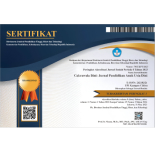Validity and Reliability of Pre-Service Teacher Competency Level in Teaching Early Mathematics Instrument Using the Rasch Model
Abstract
Keywords
Full Text:
PDFReferences
Adi, N. R. M., Amaruddin, H., Adi, H. M. M., and A'yun, I. L. Q. (2022). Validity and reliability analysis using the rasch model to measure the quality of mathematics test items of vocational High Schools. Journal of Research and Educational Research Evaluation, 11(2), 103-113.
Aldemir, J., and Sezer, O. (2009). Early childhood education pre-service teachers’ images of teacher and beliefs about teaching. Inonu University Journal of The Faculty of Education, 10(3), 105-122.
Bassok, D., Latham, S. and Rorem, A. (2016). Is kindergarten the new first grade. AERA Open, 1(4), 1–31.
Bjorklund, C., Heuvel-Panhuizen, M. V. D., and Kullberg, A. (2020). Research on early childhood mathematics teaching and learning. ZDM, 52, 607-619.
Boone, W. J. (2016). Rasch analysis for instrument development: Why, when, and how?. CBE—Life Sciences Education, 15(4), 1-7.
Boone, W. J., and Noltemeyer, A. (2017). Rasch analysis: A primer for school psychology researchers and practitioners. Cogent Education, 4(1), 1-13.
Fuson, K. C., Clements, D. H., and Sarama, J. (2015). Making early math education work for all children. Phi Delta Kappan, 97(3), 63-68.
Ghazali, M., Mustafa, Z., Rashid, R. A. A., and Amzah, F. (2021).
Parental involvement in young children's learning of numeracy. International Journal of Learning, Teaching and Educational Research, 20(1), 199-222.
Jiang, P., and Xiong, B. (2021). Analyze the quality of math kangaroo problems with a content analysis. Journal of Physics: Conference Series, 1875(1), 1-6.
Kim, H., and Connelly, J. (2019). Early childhood preservice teachers’ mathematics teaching efficacy: Effects of passion and teacher efficacy. Asia-pacific Journal of Research in Early Childhood Education, 13(1), 1-21.
Kulaksız, T., and Toran, M. (2022). Development of pre‑service early childhood teachers’ technology integrations skills through a praxeological approach. International Journal of Educational Technology in Higher Education. 19(1). 1-20.
Lester, F. K., and Cai, J. (2016). Can mathematical problem solving be taught? Preliminary answers from 30 years of research. Posing and Solving Mathematical Problems: Advances and New Perspectives, 117–135.
Mariano, M., Santos-Junior, A., Lima, J. L., Perisinotto, J., Brandao, C., Surkan, P. J., Martins, S. S., and Caetano, S. C. (2019). Ready for school? A systematic review of school readiness and later achievement. Global Journal of Human-Social Science Research, 19(10), 56-64.
Nguyen, T., Watts, T. W., Duncan, G. J., Clements, D. H., Sarama, J. S., Wolfe, C., and Spitler, M. E. (2016). Which preschool mathematics competencies are most predictive of fifth grade achievement?. Early childhood research quarterly, 36, 550-560.
Pehkonen, E., Ahtee, M., and Laine, A. (2016). Pupils’ drawings as a research tool in mathematical problem-solving lessons. Posing and solving mathematical problems: Advances and new perspectives, 167-188.
Rushdi, N. A. A. M., dan Asbulah, L. H. (2022). Kesahan dan kebolehpercayaan instrumen sikap pelajar terhadap pembelajaran Bahasa Arab (I-SPPBA) menggunakan model pengukuran RASCH. International Journal of West Asian Studies, 14, 98-110.
Soeharto, S., and Rosmaiyadi, R. (2018). The analysis of students’ higher order thinking skills (HOTS) in wave and optics using IRT with winstep software. Journal of Educational Science and Technology (EST), 4(3), 145-150.
Toffoli, S. F. L., de Andrade, D. F., and Bornia, A. C. (2016). Evaluation of open items using the many-facet Rasch model. Journal of Applied Statistics, 43(2), 299-316.
Van Zile-Tamsen, C. (2017). Using Rasch analysis to inform rating scale development. Research in Higher Education, 58(8), 922-933.
Yunus, F. A. N., Suki, N. A., Baser, J. A., Masran, S. H., Marian, M. F., dan Rahim, M. B. (2017). Kesahan dan kebolehpercayaan instrumen kompetensi pengajar TVET terhadap pengajaran teknikal berdasarkan pendekatan model Rasch. Online Journal for TVET Practitioners, 2(2).
Zhulamanova, I., and Raisor, J., (2020). Early childhood preservice teachers’ perceptions on children’s play. International Online Journal of Primary Education. 9(2). 128-143.
DOI: https://doi.org/10.17509/cd.v14i2.63683
Refbacks
- There are currently no refbacks.
Copyright (c) 2023 UPI Kampus Cibiru

This work is licensed under a Creative Commons Attribution-ShareAlike 4.0 International License.
Cakrawala Dini: Jurnal Pendidikan Anak Usia Dini
Published in collaboration Program Studi PGPAUD UPI Kampus Cibiru, APG PAUD Indonesia, and PPJ PAUD Indonesia

Cakrawala Dini: Jurnal Pendidikan Anak Usia Dini is licensed under a Creative Commons Attribution-ShareAlike 4.0 International License.
Based on a work at https://ejournal.upi.edu/index.php/cakrawaladini.














